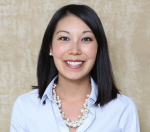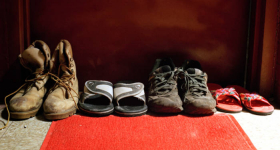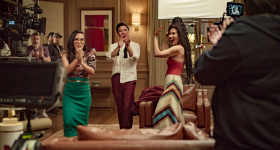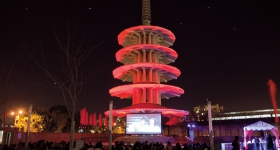Alice Tsui stars in Wong Fu's latest short, Vantage Points.
In October, Wong Fu Productions released its latest short, Vantage Points, on YouTube, which features Wong Fu’s first LGBTQ lead characters. Alice Tsui plays one of the main characters. A native of Northern California, Alice grew up in San Jose, and even as a young child, knew she had a desire to work in the media industry.
She really caught the bug for acting when she landed her first notable role in a school play in seventh grade. Since then, she’s had a number of experiences acting on stage and for the screen, has written and directed and has even modeled as well.
Alice is a dynamic, young actress with big hopes for the future of diversity in the media industry. I had the pleasure of sitting down to discuss her latest project with Wong Fu Productions. We chatted about her identity, her passion for bringing more Asian Americans to the screen, the challenges she faces in the industry as an Asian American woman, and what it takes to achieve authenticity in the representation of Asian Americans.
Tell me a little about who you are, where you’re from and how you got into acting.
I’m from San Jose. I was born and raised in California and then in 2013, I came down to Southern California to Chapman University and studied film production there. I graduated last year in 2017 and moved to L.A. immediately. I always had a deep love for acting and it was always something I knew I wasn’t going to be putting away forever, but while I was in school I wanted to study more of the production side, so I wasn’t looking to get an acting degree. But I couldn’t get away from it, so after I graduated I joined a studio and started training.
Why were you compelled to take on this role? Tell me about your experiences playing this particular character.
I’ve been watching Wong Fu since I was 13 or 14, so when I got the casting opportunity it was a really surreal moment for me because I realized I could have a chance to work with these people I’ve looked up to for so long. I got the casting opportunity through Wong Fu’s production coordinator, who co-produced a short film I was the lead in a few years ago. She reached out to me and let me know they were looking for real LGBT actresses who are Asian. I looked at the script and saw Wong Fu at the bottom and I was taken aback.
Any role like this is important to me because a major reason I am in the entertainment industry — whether writing, directing or acting — is to further diversity in the media. My whole life purpose is to focus on this. Most of the time I’m cast as just a queer character or just an Asian person. But very rarely do I get to see the intersection of both — so this project was a great opportunity to represent both of my identities in a single story without the “struggle” being the story. It was really cool to get to do that. The Wong Fu guys are amazing. They have so much integrity as artists.
Talk about the importance of your representation as a queer, Asian American woman, especially given today’s climate?
I think when you grow up without people who look like you or have stories similar to yours in the entertainment you’re watching, it does have an effect on you. And it affects what you start to believe is ideal and what you start to think you should be. For example, when I was a kid, most models and faces I saw on the covers of magazines were white, and so for the longest time growing up and going through puberty I believed that I wasn’t beautiful because I didn’t look like the people who were in the magazines. That stuck with me for a long time. I also remember even watching La La Land last year, and I thought about how there’s so much nuance in being a non-white, non-straight person in America that isn’t typically captured in cisgender, white stories. I couldn’t take the plot seriously because I kept thinking, Emma Stone is talking about how hard it is to be an actress in L.A., but she’s an attractive white woman. And she’s talking about how hard it is to get cast in these lead roles and the whole time I kept thinking, I don’t even have lead roles to audition for!
I do think it’s important, more so for the younger generation, to see their own stories represented on TV. For example, seeing Crazy Rich Asians was a mind-blowing experience and to see an all-Asian cast was so awesome. I have a sister who is 12 and the fact that she gets to see that as a child is so very impactful.
What do you hope viewers take away from this piece?
From the perspective of the plot, any story that leaves an impact on people and makes people question what they’re doing and why they’re doing it is important. Beyond the plot, I hope people start to see that LGBT stories don’t have to be stories about gay people struggling with being gay. I really liked the fact that it was a story that seamlessly incorporated both Asian American identity and the queer identity into one story without making a big deal of it. I hope people realize that’s possible rather than focusing on just one or the other.
Can you speak to your experience in general as an Asian American woman in the media industry? What have some of your challenges been, and how have you risen to face those difficulties?
Starting off it was really difficult. I started screen acting in film school. Although my school was a fantastic film school, it was very white.
The first time I fully realized I was Asian and how that would affect my casting opportunities was the moment I realized that any time there was a family relationship, I wasn’t going to get cast in the role.
That was tough knowing my opportunities were so limited. It had a big effect on me mentally because for a long time I thought it was my talent that was lacking.
We are not at a place yet where people are going to go out of their way to cast an Asian family. You never see fully Asian families unless the movie or TV show is specifically about an Asian family.
At one point in college, I auditioned for five different films. One was an Asian film, but the others were actually open to all ethnicities. One thing to note is that often times people will say that they’re open but then, in reality, a white person is always cast in the lead role.
I got called back for every one of them and cast in four of them, so that was a moment where I realized it was not about my skills and maybe it’s just been the stories I’ve auditioned for and the fact that people are not open to having an Asian lead.
You can literally count on one hand the number of famous Asian actors who are actively visible now. So that’s something I’m hoping to change in the future.
Do you have any current and/or future projects in the works?
Nothing concrete for now but I have been heavily considering getting back into writing again. There have been a couple stories that have been on my mind for a few years now and they’re stories that I can’t get out of my brain, which I think means I need to bring to life somehow. Recently I’ve been thinking of a moral dilemma that has to do with my sexuality and my relationship with my family, which is something I haven’t talked about publicly. I’m open to it but it’s one of the situations where my struggle is also my parents’ struggle and I have to respect their privacy as well. But I think it’s something a lot of people struggle with. Since the Wong Fu film came out several people have messaged me and told me about their struggles with coming out to their families. I would love to put out a story that does that story justice.
If you could choose any role to play, what would that role entail and why?
The first thing that comes to mind is Kill Bill. Like an Asian Uma Thurman or Lucy Liu as O-ren Ishii. My dream role is some kind of action drama where I can do my own stunts. I’m training in Muay Thai right now, which is like the martial arts of Thailand because I did a very small action short a couple years ago and it really turned me onto the idea of being able to do my own fight choreography in the future when I do more action films. Every time I watch an action movie, especially ones with really strong female characters, I’m always so captivated by that and I want to be able to make sure that’s my actual body and not a stunt person.
Wong Fu is known for his “authentic representation of Asian Americans.” What do you think constitutes an authentic representation of Asian Americans in the media sphere? What facets are important in order to achieve this?
I think it’s about being realistic about the struggle of being both Asian and American. Because for me that’s how my whole identity was shaped. I was raised with my parents teaching these ideals that were of Chinese tradition and then my environment teaching me these other ideals that were of American tradition, and they were directly conflicting with each other. Chinese and American culture are pretty opposite, so because of that, I think a lot of us who were raised in that environment were forced to kind of think hard about our own values and what we care about, what we think is right and what we want to pursue. I was faced with a moral dilemma from a very young age.
I think what Wong Fu does really well is show the intersection of the Asian identity and the American identity. When you do see Asian characters in mass media, if we’re not the token, our Asian identity is erased completely, and they just have us occupy an Asian face on screen because they need that for ratings or whatever. Or they focus only on the Asian aspect of us and ignore the fact that we’re 100 percent American. I think the Asian American experience is different from the American experience and also different from the Asian experience. What mass media does often times is focus just on our Asian-ness without acknowledging the fact that we’re fully American. I think Crazy Rich Asians did a pretty decent job of highlighting that intersectionality between family and the American lifestyle. It’s up-and-coming and getting better, but that’s something I think Wong Fu does really well.
Do you have any important pieces of advice specifically for any aspiring female Asian actresses?
I think that every Asian American who comes into the entertainment industry has a very specific purpose because we know it’s going to be so hard for us. I’m not doing this because I think it will be a breeze. I am doing this because I want to further Asian representation in the media. That’s my whole life purpose and it does get hard. Ultimately, the process is going to take a long time
It’s really not glamorous at all. It’s really mentally, physically and financially tough. But also, I would say, don’t let your ethnicity define you. I used to only consider myself marketable as an Asian American queer female, but at the end of the day I’m still a well-rounded human being and we’re all just trying to connect with each other’s stories at the end of the day. Remember, you’re a unique individual in your own right and if you just let your authenticity shine through, people will pick up on that. Be proud of your identity but don’t let it limit you.










Comments